You know how a lot of companies like to say they are steeped in history? Well, in the case of Demerara Distillers Limited (DDL) and their El Dorado rum, they’re not exaggerating.
The story of rum in the northeast South American country of Guyana dates all the way back to the 1640s with the introduction of sugar cane by the early European settlers. “By 1670, the foundation of Demerara rum production was laid down with the establishment of distilling into the new territories by the British,” the company notes.

DDL’s Diamond Distillery on the east bank of the Demerara River in Georgetown, Guyana.
It was a pretty remarkable achievement, considering the future county of Demerara was mostly covered—or at least flooded—by shallow Atlantic waters when the Dutch happened upon Guyana in the 1600s. Using land reclamation methods that ranged from earthworks to canals, the Dutch reclaimed the land from the ocean, the result being soil that was rich in minerality and nutrients, setting the stage way for sugar cane cultivation in the 1650s.
By 1780, there were over 300 distilleries producing their own distinctive rums. (Given the collective fumes in the air, birds with 50 percent blood-alcohol levels must have been flying into trees from one end of Demerara to the other.)
Without delving too deeply into the history, including the price of sugar and taxes, suffice it to say that by 1942 there were just nine remaining distilleries. In 1999, a final merger took place, with the remaining companies all falling under the umbrella of Demerara Distillers Ltd. But as the DDL folks like to point out, that also involved “the transfer of the various stills, equipment and expertise.”
Consider it as a distillation of knowledge and experience that is now responsible for the production of a variety of internationally acclaimed rums under the El Dorado brand, ranging from three to 25 years of aging. (A reminder here that when you’re talking about the age of rum/scotch/port, etc., the age represented on the bottle label will be of the youngest liquid in the blend. So the rums used in a 12-year-old rum, for example, have all been aged 12 years or more.)
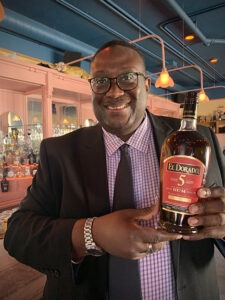
El Dorado’s Master Distiller Shaun Caleb.
I had the opportunity to meet DDL’s Master Distiller Shaun Caleb on Friday during a media event hosted by Woodman Wines & Spirits at Bar Mordecai in Toronto. He’s a pretty cool—and learned—dude. Caleb initially joined DDL in 2003 at age 21, before heading off to on a full scholarship (he was a brilliant high school student in Guyana) to Princeton University, where he secured a degree in chemical engineering. Caleb returned to full-time duty on August 8, 2007, apprenticing under then-Master Distiller George Robinson, before eventually ascending to the Master Distiller position himself.
You can appreciate how rum—and its accompanying traditions—are in the DNA of the Guyanese when listening to Caleb. It’s one of the reasons the company is renowned for the multi-decade tenure of many of its employees.
THEIR STILLS ARE HOW OLD!?
But what are perhaps the most vital tools of the trade have never been replaced at the company—its “heritage stills.” While they have also built cutting-edge modern stills, DDL’s nine heritage still date back centuries. Atop the list is their double wooden pot still, which was first installed in Port Mourant in 1732. It’s the only one of its kind still in operation anywhere on earth! With an intimate knowledge and understanding of the influences that certain flavours and characteristics play on the final product, the well-schooled blenders at El Dorado coax out the desired qualities by making slight adjustments to their various pot and column stills, the construction materials of which range from copper and steel to the incredibly dense Greenheart wood, native to Guyana and next-door neighbour Suriname. (They used to make ships out of this stuff.)
That reclaimed soil, high in minerality and nutrients, certainly contributes to the sugar cane and eventually molasses that is fermented to produce the rum, Caleb indicates, but those stills really help make El Dorado’s rums unique.
“The environmental influence of the terroir that comes from the Demerara environment is one factor—and the heat and humidity accelerate aging,” Caleb stresses. “But the other factor is the uniqueness of those heritage stills—not only in terms of them being one-of-a-kind and their age, but also the unique qualities that they produce—it’s something that no other distiller can replicate. When you combine that with the authenticity of our process and the fact that our traditions have been maintained for literally centuries, what we offer to the market becomes a very difficult proposition to beat.”
And what has that well-trained brain of Caleb imparted as Master Distiller at El Dorado? “Modernizing the approach while maintaining the traditions,” he says. “For example, understanding flavour chemistry and flavour science, and therefore defining the rums in a way that chemically ensures that they are consistent with what it has traditionally always been. I have been studying some of the chemical components as a chemical engineer and ensuring that the production process builds those chemical requirements into it. So it’s really about doing the same things, but in a much more technologically advanced manner.”
And what can you expect from the magic silky, amber elixir that emerges on the other end? Highly aromatic sugar cane-derived aromas and flavours that include molasses and vanilla, with fruity, floral and chocolatey notes are commonplace. There’s also a distinctive minerality, “like salted toffee,” that comes from the soil, El Dorado cites. Other notes are derived from the barrel aging process, including spice and vegetal, herbal and earthy aromas, with a consistently rich creaminess on the palate. And note that the sugar content of every El Dorado rum is a natural by-product of the process—no sugar is ever added.
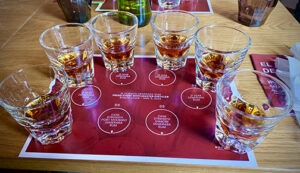
Our media tasting lineup (don’t worry, nobody finished all the glasses…or even most of them).
Interestingly, the company has diversified in the beverage industry. Today, DDL is the leading producer of non-alcoholic beverages in Guyana. It serves as the bottler for international brands such as Pepsi, Seven-Up and Slice, and is the producer of its own range of carbonated soft drinks under its SOCA brand.
But the rums rule! And a great compliment to El Dorado was the diversity of our group’s favourites among the six rums we sampled.
Here’s a quick look at some of the extensive El Dorado portfolio available at the LCBO so that you can figure out which rum fits you best.
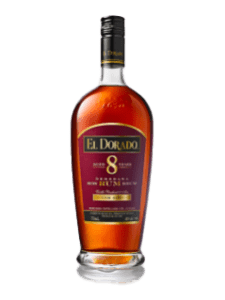 El Dorado 8 Year Old Cask Aged Demerara Rum — Guyana ($38.65)
El Dorado 8 Year Old Cask Aged Demerara Rum — Guyana ($38.65)
This was introduced in the mid-2000s to fill the gap between El Dorado’s mixer range (3- and 5-year-old) and the premium range. This can work as a sipping rum but is also robust enough for cocktail blends while retaining its spirit integrity. Oaky tannins contribute some bitter notes, but predominant notes are of dried tropical fruit, caramel, butterscotch, molasses, cinnamon and a mixed nut medley. Despite its value pricing, it actually won the 2013 Rum Trophy at the International Wine & Spirits Competition, due to its outstanding versatility.
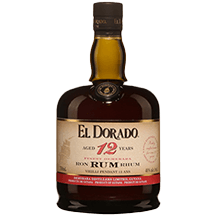 El Dorado 12 Year Old Rum — Guyana ($49.65)
El Dorado 12 Year Old Rum — Guyana ($49.65)
Generally accepted as the best bang for the buck in El Dorado’s portfolio, this was acclaimed as the 2015 International Wine & Spirits Competition Rum Trophy winner. It might be my favourite of the lot, despite the affordable price point, straddling the line between the depth of El Dorado’s higher-end rums and the punch of its depth and slight alcohol burn. Blended from the company’s Enmore and Diamond Coffey stills and Port Mourant double wooden pot still, look for molasses, brown spices, bananas and dried tropical fruits. Great depth. It really opens up with a few drops of water too (which is always good to experiment with when sipping many spirits).
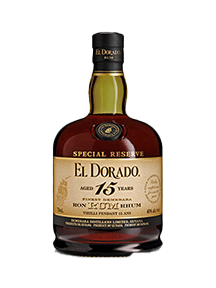 El Dorado Special Reserve 15 Year Old Rum — Guyana ($73.40)
El Dorado Special Reserve 15 Year Old Rum — Guyana ($73.40)
This rum, a blend of all four of El Dorado’s heritage stills—the double wooden pot, single wooden pot, wooden Coffey still and metal Coffey still—is what put El Dorado on the world map for elite rums. (It actually helped put rum itself into the international limelight as a spirit worthy of premium status.) Over a 20-year period, before El Dorado stopped entering in 2018, this rum earned top honours six times at the International Wine & Spirits Competition (the El Dorado family won nines times over that period, while no other rum brand won it more than twice). On the entry there are spices and fruit, transitioning to a complex mid-palate, with an incredibly long finish thanks to the work of the double wooden pot still. The notes include orange and vanilla, backed with smokey tobacco, leading to body of banana, silky molasses, leather and cigar smoke and peat. It’s similar to a scotch in its depth, while being elegant throughout the tasting experience.
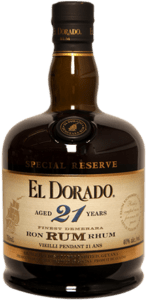 El Dorado 21 Year Old Rum — Guyana ($127.40)
El Dorado 21 Year Old Rum — Guyana ($127.40)
This rum absolutely melts into the palate with precious little evidence of its alcohol content. Notes include tropical fruits, tobacco, mocha, toffee and dark spices, with a velvety mouthfeel and a long, long, smooth finish. El Dorado highlights this as the “highest-scoring rum ever by the Beverage Tasting institute of Chicago.” I was shocked how mellow it was. Sip this like a fine, treasured cognac.
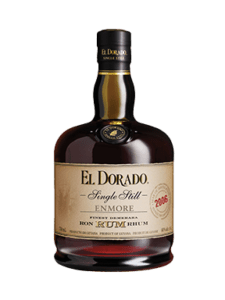 El Dorado Cask Strength Single Still Enmore — Guyana ($120.50)
El Dorado Cask Strength Single Still Enmore — Guyana ($120.50)
It registers as a 54.3% alc. content, and there’s no hiding the heat of that alcohol, but fruit and molasses notes just leap out from beneath those vapours, each shouting “Pick me! Pick me!” You can add a little water, but I prefer to just enjoy it slowly. As one Guyana native observed at my table, “It reminds me of Demerara sugar.” This seems like Guyana rum in its truest, purest—albeit expertly nurtured—form.
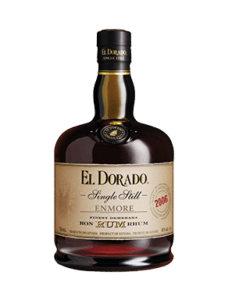 El Dorado Cask Strength Single Still Port Mourant — Guyana ($120.55)
El Dorado Cask Strength Single Still Port Mourant — Guyana ($120.55)
From the company’s oldest still, this sculpted brute, having been laid down in oak barrels for 12 years, comes in at 56.7% alc. But the alcohol, to me, seems less obtrusive than with the Enmore. Aromas of sweet baked apple, vanilla, cinnamon and even cherries and oranges are in evidence. Hints of peat and wood contribute to the multilayered expression. It’s spicy without the heat, with sea salt and truffles coming in late. Yes, there’s a lot going on in this highly concentrated rum.

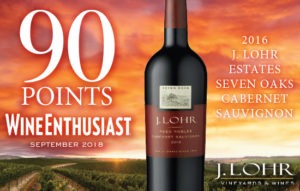
Leave a Reply
Your email is safe with us.